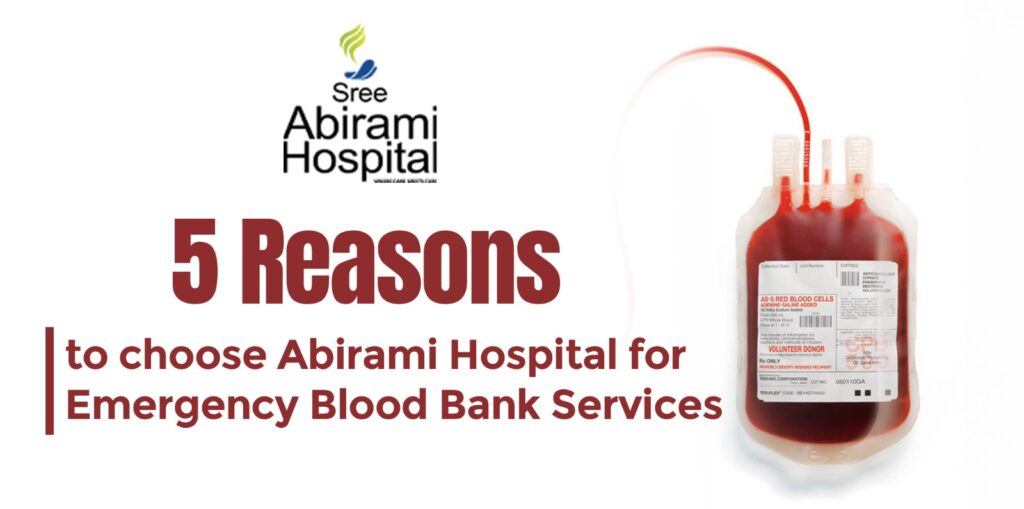
The blood bank services entail the activities of collection, testing, processing, storage, and distribution of blood and blood derivatives towards medical use. These are core activities of health systems since they ensure a safe and adequate blood supply to cater for patients who demand the same.
Blood banks are integral sources of sustaining lives during emergencies, during surgeries as well as during treatment of conditions such as anemia, cancer, and other blood disorders.
At Abirami Hospital, we understand that time matters most during a medical emergency. Our 24×7 Emergency Blood Bank Services ensure safe and timely transfusions of blood.
How are Abirami Hospitals safe for Emergency Blood Bank Services?
Safety comes first at Abirami Hospital Blood Bank. Each blood unit goes through rigorous screening against infections like Hepatitis B & C, syphilis, and malaria, providing complete safety against risks for patients.
Cross-matching techniques of contemporary standards are used prior to transfusions to ensure compatibility and prevent risks. Our state-of-the-art storage facilities store blood at WHO-standard temperatures, ensuring retention of quality and efficacy. With an efficient team of trained personnel and stern hygiene measures, we guarantee each transfusion as 100% safe, dependable, and life-preserving.
5 Reasons Why Select Emergency Blood Bank Services?
1. 24/7 Availability
The blood bank operates around the clock, ensuring that fundamental blood and blood components are always available during emergencies.
2. Diverse Spectrum of Blood Derivatives
We offer extensive coverage of a variety of medical requirements from whole blood to packed red cells, fresh frozen plasma, platelet concentrates, and cryoprecipitate.
3. Tight Safety Requirements
Each unit is subjected to comprehensive screening for HIV, Hepatitis B and C, syphilis, and additional infections, ensuring that transfusions are 100% safe.
4. Advanced Storage Facilities
Latest technologies of refrigeration and preservation are used to preserve the quality and integrity of blood during crucial care scenarios.
5. Trusted Within the Community
By conducting periodic voluntary blood donation camps and earning a name for humanitarian service, Abirami Hospital has established a dependable name in emergency medical care.
Step By Step Procedure Of Emergency Blood Bank Services At Abirami Hospital
1. Donor Screening
Voluntary or replacement donors are registered and undergone health checks and questionnaires intended to assure their fitness for blood donation.
2. Blood Collection
Equipment that is both safe and sterile is employed to gather blood from qualified donors, overseen by proficient medical personnel.
3. Testing & Screening
Donated blood is subjected to required tests for contagious disorders like HIV, Hepatitis B and C, syphilis, and malaria and therefore becomes absolutely safe.
4. Blood Processing
The blood has well-defined components like red blood cells, plasma, platelets, and also cryoprecipitate, in order to fulfill a number of medical requirements.
5. Storage and Preservation
Bht and its components are preserved at high-technology temperature-controlled facilities to retain quality and effectiveness.
Compatibility tests are done before a transfusion to match the recipient’s and the donor’s blood and avoid reactions.
6. Cross-M
Compatibility tests are done before a transfusion to match the recipient’s and the donor’s blood and avoid reactions.
7. Blood Transfusion
FAQs of Emergency Blood Bank Services
- What is the rarest blood type?
The rarest blood type globally is AB negative (AB-). It has a frequency of less than 1% among the world population and therefore presents a very low frequency. How rare a blood type presents has got a lot to do with the interplay of the ABO blood group system (A, B, AB, or O) and also the Rh factor (positive or negative).
- Is blood donation good for you?
In fact, the process of blood donation doesn’t only benefit recipients but also has favorable results for the health of donors. Even though the ultimate purpose of blood donation is the salvation of lives, it should be appreciated that there are an assortment of health rewards for donors.
3.How many tests are available at blood banks?
The blood banks conduct a number of tests from the donated blood to determine its safety, compatibility, and quality before issue during transfusions. These tests are important in ensuring the health of both the donor and the recipient.
Conclusion
Emergency Blood Bank Services of Abirami Hospital serve as a foundation of confidence, reliability, and safety during hours of crisis. With state-of-the-art facilities, social support from the community and around-the-clock service delivery, we are still saving lives day after day.

